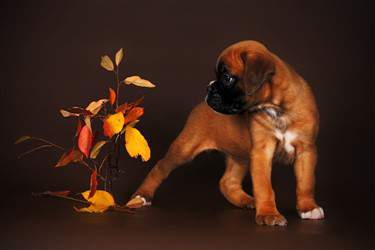Puppy Care
Boxer Puppy Care

Overview
Having a Boxer puppy is quite wonderful and rewarding. This gives the owner an opportunity to see their dog at such a young age and then watch them quickly grown into strong (and large) adults.
If you are purchasing a Boxer puppy, the dog should be at least 8 weeks old. In many regions it is illegal to have a puppy at a younger age. Up until 8 weeks, the puppy will need to be nourished by its mother.
We're Home!
That
Boxer newborn puppy that you picked out has rapidly matured into an 8 week old and it's time for your new family member to join the household. Bringing a puppy home should be well planned in advance. If you have a large family, other members must be told to keep the environment calm and peaceful until your Boxer puppy has a chance to gain their bearings and become used to its new home.
- Have everything you need so that you do not need to suddenly run out to the store for a forgotten item.
- Do not allow the puppy to be rushed at by many people wishing to hug, pat and smother him or her with kisses. That can come a bit later. Your new Boxer must be approached gently and with warm voices.
- Puppies are a good, robust size but are still fragile. It is very sad when a puppy is stepped on accidentally; this can cause great harm. From birth to the 1 year mark, trauma is the leading cause of fatalities with this breed. Children must understand how to gently treat a pup. Very young children should be watched during interaction. All members of the home must be very aware of what may be underfoot.
- Your Boxer puppy should be given a tour of the home. Do not expect your new pup to know where everything is! Show him or her where they can find their water, where to expect their meals to be served, their dog bed and their toys. A puppy needs the security of knowing where to find what they need.
Puppies will need quite a bit of care from you. This includes:
- Feeding - A puppy should be fed 3-4 times per day. More feeding information can be found in our Feeding section. Only high quality puppy food must be given. This will be a time of rapid growth and your Boxer puppy needs the right dog food for optimal health.
- Vaccinations - All puppies will need the full schedule of vaccinations. This is absolutely vital to the health of the pup. If the budget is tight, your dog's veterinarian should be able to provide a discount or recommended animal clinics which provide shots for a very minimal fee. This includes that absolutely necessary Heart worm prevention medication, as well.
- Comfort and safety - Boxer puppies are rambunctious. They will jump, bounce and play. They will need loving attention and interaction with their owner or owners. Plenty of room to play, lots of toys and acts of love are crucial to the physical and emotional growth of a pup. A puppy is just learning about its world; yelling or hitting is never called for. Through love, patience and understanding a puppy will learn what is expected. Negative reactions from its owner will simply teach the puppy to be afraid.
- Housebreaking - This should begin as soon as you bring your puppy home. Read more in our housebreaking section. When started early and with consistency, your Boxer puppy will soon learn where it is appropriate to eliminate.
Some Things to Expect
The first year will be full of changing behaviors and a change in
physical appearance. Here's what you can expect:
- A Boxer puppy will whine if he is hungry, wants attention or once he is learning house training, if he has a bathroom need
- The time to instill training for barking and other behavior is now - before habits can form
- Puppies are super hyper, but will also sleep quite a bit - Anywhere from 15 to 18 hours per day including night time and daytime naps
- The first year is one of rapid growth, but do expect starts and stops. As your Boxer reaches adolescence, there is sometimes a brief period of stalled weight gain at which time a Boxer may appear too skinny. This typically only lasts a few months before that final gain happens that allows him to fill out.
- Puppyhoood is the time to do socialization training - You'll want to introduce your puppy to as many people, other dogs, events and situations as possible so that he learns control and gains self-confidence.
Health Check
A Boxer puppy should be checked over every day to check for certain issues.
- Eyes- The eyes should be clear and bright. Any excessive discharge is a reason to go to the veterinarian
- Ears and nose - These areas should be cleaned each day with a damp, soft washcloth. Discharge of any color is a reason for a checkup with the vet
- Breathing - A puppy's breathing should always be clear and easy. Forced breathing, wheezing, coughing or other strange sounds must be taken care of immediately through the dog's veterinarian or closest animal hospital
- Limping - Puppies may be a bit clumsy or wobbling when very young. However limping is never normal. This must be brought to a vet's attention ASAP

Tank - 9 months old
Photo courtesy of owner:
Jaymie Conner
- Skin - It is normal for a Boxer puppy to have some loose skin around the neck area and there will be some facial folds. These areas can hold in moisture which can lead to a fungal or bacterial infection. Moisture can accumulate when the pup drinks or when he drools. Keep the area nice and dry to prevent any problems.
AllBoxerInfo.com All content is protected by US and International copyright laws. All rights reserved.
We are a participant in the Amazon Services LLC
Associates Program, an affiliate advertising program designed to provide a means for us to earn fees by linking to Amazon.com and affiliated sites.
